

Here is some Japanese money. If you've never been to Japan before it may not seem like real money to you and you're more likely to let it pass through your hands more quickly--best to resist that temptation.
For the most current exchange rates, go to Oanda or to Xe.com. Note that there are slight differences for the exchange rates in New York, London, and Tokyo.
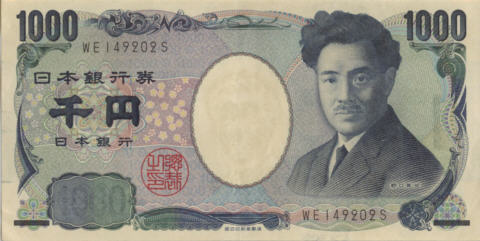
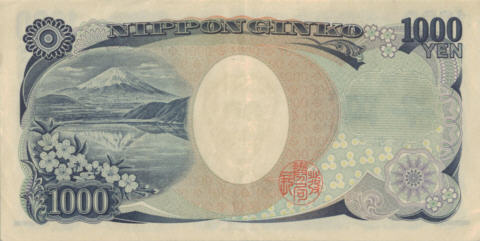
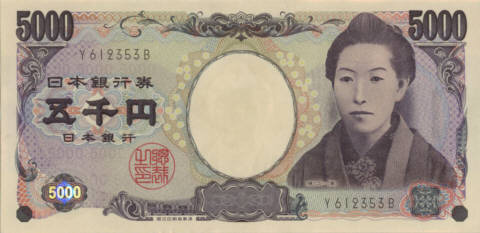
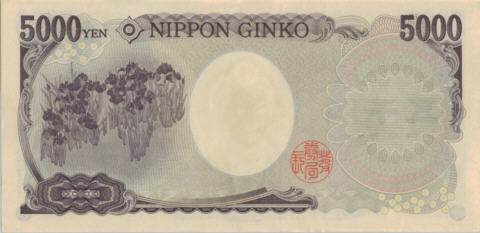
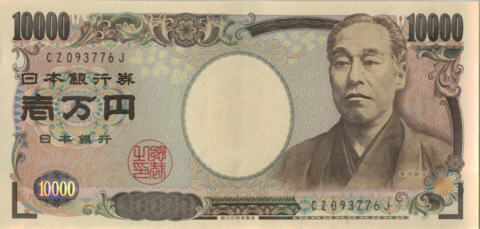
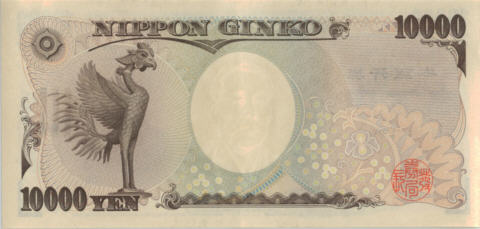

From the left, there is the aluminum one yen coin, which costs more to make than it's worth, then the 5, 10, 50, 100, and 500 yen coins. Vending machines accept all coins except the ones and fives, as well as 1000 yen bills and for a select number at stations, IC cards. Pay phones take only 10 and 100 yen coins, or pre-paid phone cards.

And now here is something you don't see any more. In 2000 for the Okinawa Summit this 2000 yen note was introduced, along with a year 2000 special 500 yen coin.
But there wasn't much acceptance for the new bill. Vending machines wouldn't take it and the public didn't feel any real need for it. It's almost a collector's item now.
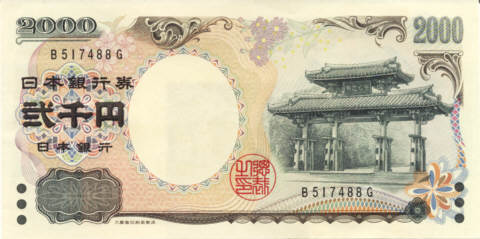
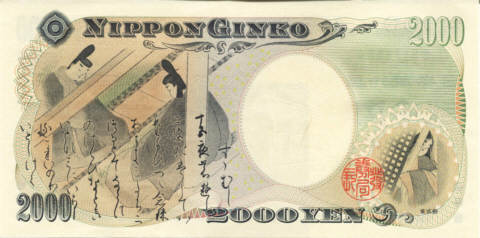
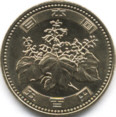
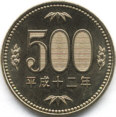
January 1st - New Year's Day (Shogatsu or Ganjitsu)
January 2nd - 4th - New Year's Holidays -- banks, government offices, and many stores closed
January 13 (2nd Monday in January) - Coming of Age Day (Seijin no Hi)
February 11 - National Foundation Day (Kokuritsu Kinenbi)
February 23 - Emperor's Birthday
March 20 - Vernal Equinox Day (Shunbun no Hi)
April 29 - Showa Day (Honoring the former Emperor Showa's (Hirohito) birthday)
May 3rd - 5th - Golden Week
July 13-15 Obon Festival - not official holiday, but some stores in eastern Japan may be closed
July 21 - (3rd Monday of July) - Marine Day (Umi no Hi)
August 11 - Yama no Hi - Mountain Day
August 13-16 Obon Festival - not official holiday, but some stores in Japan may be closed
September 18 - (3rd Monday of September) - Respect for the Aged Day (Keirou no Hi)
September 23 - Autumnal Equinox Day (Shubun no Hi)
October 13 - (2nd Mon in Oct) Sports Day (Tai'iku no Hi)
November 3 - National Culture Day (Bunka no Hi)
November 23 - Labor Thanksgiving Day (Kinrou Kansha no Hi)
December 28-31 - Some offices/sights may be closed
January 1st - New Year's Day (Shogatsu or Ganjitsu)
January 2nd - 4th - New Year's Holidays -- banks, government offices, and many stores closed
January 12 (2nd Monday in January) - Coming of Age Day (Seijin no Hi)
February 11 - National Foundation Day (Kokuritsu Kinenbi)
February 23 - Emperor's Birthday
March 20 - Vernal Equinox Day (Shunbun no Hi)
April 29 - Showa Day (Honoring the former Emperor Showa's (Hirohito) birthday)
May 2nd - 6th - Golden Week
July 13-15 Obon Festival - not official holiday, but some stores in eastern Japan may be closed
July 20 - (3rd Monday of July) - Marine Day (Umi no Hi)
August 11 - Yama no Hi - Mountain Day
August 16-18 Obon Festival - not official holiday, but some stores in Japan may be closed
September 21 - (3rd Monday of September) - Respect for the Aged Day (Keirou no Hi)
September 23 - Autumnal Equinox Day (Shubun no Hi)
Oct 12 - Sports Day (Tai'iku no Hi)
November 3 - National Culture Day (Bunka no Hi)
November 22 - Labor Thanksgiving Day (Kinrou Kansha no Hi)
December 28-31 - Some offices/sights may be closed
NB: If Respect for the Aged Day is on Sept 21st and Autumn Eaquinox Day is on Sept 23rd (like in 2026), then Sept 22nd automatically becomes a holiday, called "Silver Week".
While banks, post offices and so on will be closed on national holidays, many other sightseeing spots are still open. However, more than a few places like museums will be closed on the business day following it. It would be wise to check the website of the place before heading out.
Japan is still largely a cash based society. Credit cards are used but generally for medium sized to major hotels, chain stores, department stores, large retail outlets, stores that deal with lots of international tourists, plus a growing number of urban taxis and supermarkets. Nevertheless, acceptance is growing, and if you have a card that has no foreign exchange fee charges, you can save yourself a good sum of money. However, you can now withdraw cash at machines in any Japanese Post Office or Japanese 7-11 using cards issued by Visa International, MasterCard, American Express and Diners Club, and debit cards issued by financial institutions participating in Visa Electron or Maestro Network, or ATM cards issued by financial insitutions participating in the Plus or Cirrus networks. The 7-11s are open virtually 24/7, and the post office ATM hours vary by the size of the branch. With these two options alone, there are tens of thousands of places across Japan. You can find the closest 7-11 to you here.
In addition, a growing number of Family Mart and Lawson's convenience stores are also adding more ATM machines that take international cards. Other options include Shinsei Bank and some Don Quijote stores.
Generally speaking, getting a cash advance from credit cards is not advisable unless you have no other choice, since many banks charge near extortion-like interest rates that accrue from the minute you get the money. It is for all intents and purposes, legalized loan sharking.
You will also get a better exchange rate by using your ATM card in Japan compared to exchanging cash. There may be a certain out of network fee for using it (check with your bank first) as well as a foreign exchange fee (often 3%), but often is only a few dollars unless you are doing business with a ripoff bank. Having your money in a credit union or Schwab account will often be a lot kinder to your wallet in many ways.
If you do plan to use your ATM in Japan, make sure the bank knows about it first so they don't suspect fraudulent usage and freeze your account.
If you want to compare, this is the age of the internet and you can easily see the rates online. Look at the Airport bank exchange rates and then compare that with the latest rates of your own bank at home.
If you are interested in looking at older and outdated versions of yen (and before that, sen), try looking at The Old Japanese Money Video or Bank Note World.
For More Info:
Here is a link to The Japan FAQ: Know Before You Go